Chief Obafemi Jeremiah Oyeniyi Awolowo, GCFR (Yoruba:
Obáfẹ́mi Awólọ́wọ̀; 6 March 1909 – 9 May 1987), was a Nigerian nationalist and statesman who played a key role in Nigeria's independence movement, the First and Second Republics and the Civil War. He was the first premier of the Western Region and later federal commissioner for finance, and vice chairman of the Federal Executive Council during the Civil War. He was thrice a major contender for his country's highest office.[1] A native of Ikenne in Ogun State of south-western Nigeria, he started his career, like some of his well-known contemporaries, as a nationalist in the Nigerian Youth Movement in which he rose to become Western Provincial Secretary. Awolowo was responsible for much of the progressive social legislation that has made Nigeria a modern nation.[2] He was the first Leader of Government Business and Minister of Local Government and Finance, and first Premier of the Western Region under Nigeria's parliamentary system, from 1952 to 1959. He was the official Leader of the Opposition in the federal parliament to the Balewa government from 1959 to 1963. In recognition of all these, Awolowo was the first individual in the modern era to be named Leader of the Yorubas (Yoruba: Asiwaju Awon Yoruba or Asiwaju Omo Oodua).
Obafemi Awolowo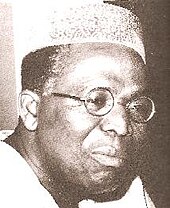
1 October 1954 – 1 October 1960Succeeded bySamuel AkintolaFederal Commissioner for FinanceIn office
1967–1971Preceded byFestus Okotie-EbohSucceeded byShehu ShagariPersonal detailsBorn6 March 1909
Ikenne, Western Region, British Nigeria
(now Ikenne, Ogun, Nigeria)Died9 May 1987 (aged 78)
Ikenne, Ogun StatePolitical partyUnity Party of Nigeria(1978–1983)
Action Group (1950–1966)Spouse(s)Hannah Idowu Dideolu AwolowoRelationsYemi Osinbajo (grandson-in-law)
Oludolapo Osinbajo (granddaughter)ChildrenSegun Awolowo
Tola Oyediran
Oluwole Awolowo
Ayodele Soyode
Tokunbo Awolowo-DosunmuAlma materUniversity of LondonProfessionLawyer
Early lifeEdit
Obafemi Awolowo was born on 6 March 1909 in Ikenne, in present-day Ogun State of Nigeria.[3] His father was a farmer and sawyer who died when Obafemi was about seven years old. [4] He attended various schools, including Baptist Boys' High School (BBHS), Abeokuta; and then became a teacher in Abeokuta, after which he qualified as a shorthand typist. Subsequently, he served as a clerk at the Wesley College Ibadan, as well as a correspondent for the Nigerian Times.[5] It was after this that he embarked on various business ventures to help raise funds to travel to the UK for further studies.
Following his education at Wesley College, Ibadan, in 1927, he enrolled at the University of London as an External Student and graduated with the degree of Bachelor of Commerce (Hons.). He went to the UK in 1944 to study law at the University of London and was called to the Bar by the Honorable Society of the Inner Temple on 19 November 1946.[4][6] In 1949 Awolowo founded the Nigerian Tribune, a private Nigerian newspaper, which he used to spread nationalist consciousness among Nigerians.[7]
PoliticsEdit
Awolowo was Nigeria's foremost federalist [Citation needed]. In his Path to Nigerian Freedom (1947) – the first systematic federalist manifesto by a Nigerian politician – he advocated federalism as the only basis for equitable national integration and, as head of the Action Group, he led demands for a federal constitution, which was introduced in the 1954 Lyttleton Constitution, following primarily the model proposed by the Western Region delegation led by him. As premier, he proved to be and was viewed as a man of vision and a dynamic administrator. Awolowo was also the country's leading social democratic politician.[1] He supported limited public ownership and limited central planning in government.[1] He believed that the state should channel Nigeria's resources into education and state-led infrastructural development.[8] Controversially, and at considerable expense, he introduced free primary education for all and free health care for children in the Western Region, established the first television service in Africa in 1959, and the Oduduwa Group, all of which were financed from the highly lucrative cocoa industry which was the mainstay of the regional economy.[9]
Crisis in Western NigeriaEdit
From the eve of independence, he led the Action Group as the Leader of the Opposition in the federal parliament, leaving Samuel Ladoke Akintola as the Western Region Premier. Disagreements between Awolowo and Akintola on how to run the Western region led the latter to an alliance with the Tafawa Balewa-led NPC federal government. A constitutional crisis led to the declaration of a state of emergency in the Western Region, eventually resulting in a widespread breakdown of law and order.
Excluded from national government, Awolowo and his party faced an increasingly precarious position. Akintola's followers, angered at their exclusion from power, formed the Nigerian National Democratic Party (NNDP) under Akintola's leadership. Having previously suspended the elected Western Regional Assembly, the federal government then reconstituted the body after manoeuvres that brought Akintola's NNDP into power without an election. Shortly afterwards Awolowo and several disciples were arrested, charged, convicted (of treason),[10] and jailed for conspiring with the Ghanaian authorities under Kwame Nkrumah to overthrow the federal government.[11]
LegacyEdit
In 1992, the Obafemi Awolowo Foundation was founded as an independent, non-profit, non-partisan organisation committed to furthering the symbiotic interaction of public policy and relevant scholarship with a view to promoting the overall development of the Nigerian nation. The Foundation was launched by the President of Nigeria at that time, General Ibrahim Babangida, at the Liberty Stadium, Ibadan.[12] However, his most important bequests (styled Awoism) are his exemplary integrity, his welfarism, his contributions to hastening the process of decolonisation and his consistent and reasoned advocacy of federalism-based on ethno-linguistic self-determination and uniting politically strong states-as the best basis for Nigerian unity. Awolowo died peacefully at his Ikenne home, the Efunyela Hall (so named after his mother), on 9 May 1987, at the age of 78 and was laid to rest in Ikenne, amid tributes across political and ethno-religious divides.
BibliographyEdit
Path to Nigerian FreedomAwo – Autobiography of Chief Obafemi AwolowoMy Early LifeThoughts on the Nigerian ConstitutionThe People’s RepublicThe Strategy & Tactics of the People's Republic of NigeriaThe Problems of Africa – The Need for Ideological AppraisalAwo on the Nigerian Civil WarPath to Nigerian GreatnessVoice of ReasonVoice of CourageVoice of WisdomAdventures in Power – Book 1 – My March Through PrisonAdventures in Power – Book 2 – Travails of Democracy
See alsoEdit
Ikenne Residence of Chief Obafemi Awolowo
ReferencesEdit
^ a b c James Booth. Writers and politics in Nigeria. Africana Pub. Co., 1981, p. 52.^ Historical dictionary of the British empire, Volume 1^ Nigerian Political Parties: Power in an Emergent African Nation, R. L. Sklar (2004), Africa World Press, ISBN 1-59221-209-3^ a b Harvey Glickman (1992). Political Leaders of Contemporary Africa South of the Sahara: A Biographical Dictionary. Greenwood Press. ISBN 9780313267819.^ "then British owned"^ Kevin Shillington (2013). Encyclopedia of African History 3-Volume Set. Routledge. p. 197. ISBN 9781135456696.^ "About Us". Nigerian Tribune. Archived from the original on 20 May 2011. Retrieved 11 May 2011.^ Case For Ideological Orientation, O. Awolowo.^ "Obafemi Awolowo: The Man With a Plan"^ Siollun, Max. Oil, Politics and Violence: Nigeria's Military Coup Culture (1966-1976). Algora. p. 15. ISBN 9780875867090.^ Adventures in Power Book One: My March through Prison, O. Awolowo Macmillan Nigeria Publishers, 1985.^ "The Obafemi Awolowo Foundation"
Ikenne Residence of Chief Obafemi Awolowo
The Ikenne Residence of Chief Obafemi Awolowo represents the hometown of the late Chief Obafemi Awolowo. The structure is located in Ikenne, Ogun state, south west Nigeria. The remains of Obafemi and Hannah Idowu Dideolu Awolowo(HID) were buried in this compound.[1][2][3]
The compound consists of a Mausoleum where they were buried. The Museum harbored some of his personal effects, which are displayed for tourism. As part of the museum is the Mecedes Benze used in 1979 and 1983 campaign for his political ambition. The Efunyela hall was built in the memory of his late mother chief (mrs) Efunyela Awolowo. The hall is used for reception of visitors and for hosting major functions. It also has a worship sanctuary called the Embassy of the most high. The building also has a library called Sopolu Library built in remembrance of his late father.
Background
The buildings and all the structures in Awo's compound represent the hometown of Chief Obafemi Awolowo, where he lived before his death.[4]
One of the structures in the compound is Efunyela Hall which was commissioned in the year 1979 in memory of his late mother, Chief (Mrs) Efunyela Awolowo.[5] The hall serves as reception and hosting of family functions. The compound also hosts a museum with a figure of old eight sitter Mercedes Benze used in 1979 and 1983 for his political campaign. The car was purchased in the year 1970. Aside the car are some other valuable items of memorial importance which include honorary academic gowns from University of Cape Town , University of Ibadan and University of Lagos and also the Awo’s Cap.[5] The museum was built on 4 August 1989.[6]
Photo gallery of late Chief Obafemi Awolowo Residence
- Akinwunmi, Taylor. "FG to give HID Awolowo state burial". Today. Retrieved 27 October 2016.
- ^ Ibekwe, Nicholas. "How HID Awolowo died". Premium Times. Retrieved 27 October 2016.
- ^ Olatunji, Daud. "Hannah Idowu Dideolu Awolowo: Buried in grand style". Vanguard. Retrieved 27 October 2016.
- ^ The Editor. "HID Awolowo (6) Inside Awolowo's Ikenne compound". Encomium. Retrieved 27 October 2016.
- ^ a b Debo, Oladimeji. "Nigeria: Obafemi Awolowo Inside the Late Sage's Ikenne Home". All Africa. Guardian. Retrieved 27 October 2016.
- ^ Debo, Oladimeji. "Nigeria: Obafemi Awolowo - Inside the Late Sage's Ikenne Home". All Africa. Guardian. Retrieved 27 October 2016.
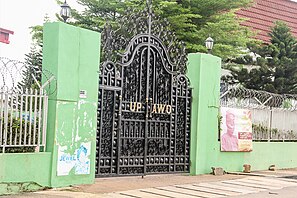
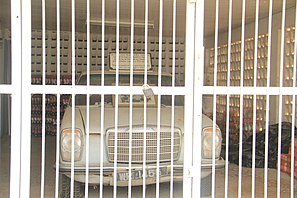
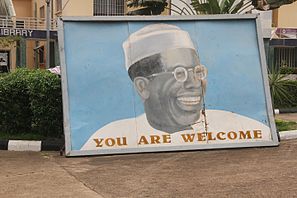






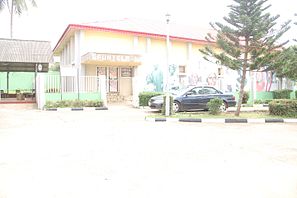





There has been no response to "Reason Why Obafemi Awolowo Is The Father Of All, And His Biography"
Post a Comment